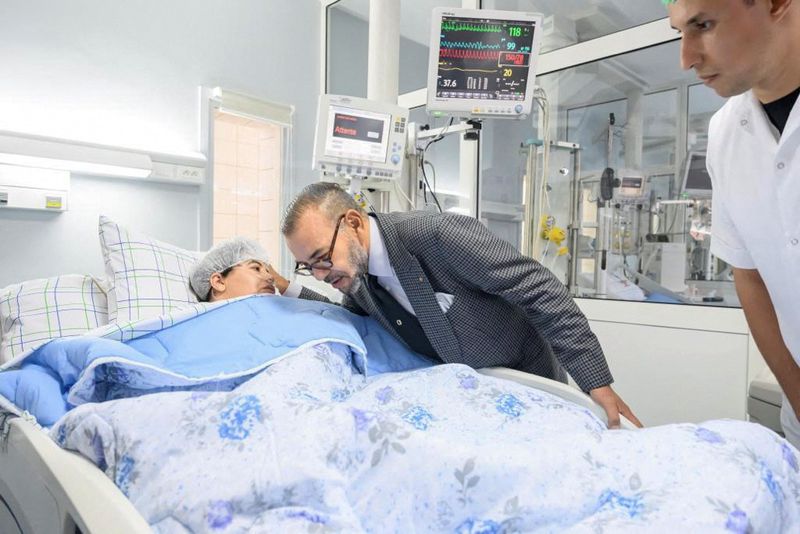By Aidan Lewis
(Reuters) - When a devastating earthquake shook Morocco's High Atlas (NYSE:ATCO) mountains on Sept. 8, residents of poor areas where it struck turned for help to the state and the man who leads it, King Mohammed VI.
Yet the monarch, with his sweeping power, has kept a low profile, making just three appearances since then. He chaired two emergency response meetings with officials in Rabat and visited a hospital in Marrakech, near the disaster zone, where he gave blood after a nationwide appeal for donors.
The king, who typically keeps a regal distance from the public and stays above the political fray, has not yet visited the worst affected zone where the 6.8 magnitude tremor killed more than 2,900 people, the deadliest in Morocco since 1960.
This publicity-shy approach has been a hallmark of his rule since succeeding his father to the throne aged 35 in 1999, when he took charge of a North African kingdom that was poor, economically stagnant and politically repressed.
He has been softer on dissent than his father, Hassan II, and he has pursued economic reforms that have attracted foreign investors and expanded the industrial base, making the kingdom an economic powerhouse in Africa.
But the king, whose titles include Supreme Commander of the Royal Armed Forces and Commander of the Faithful, has been cautious about political change, yielding little power, which critics say stifles government initiative even in a crisis.
"When the king isn't there, not only does the government not function but when it comes to big crises the state doesn't function," said Aboubakr Jamai, a professor at the American College of the Mediterranean in France.
A government source said Morocco had institutions and civil society groups capable of acting without orders from the palace.
The official, who asked not to be named because he was not authorised to speak to the media, also said the authorities had launched a coordinated and prompt response in the logistically challenging circumstances of the earthquake.
LIMITED SHIFT
When mass protests flared in Tunisia and Egypt in 2011, bringing down autocratic rulers, pro-democracy groups rallied across Morocco to demand change. Mohammed handed some more power to the elected parliament, but it was only a limited shift.
The king retained the right to choose the prime minister from the party with the most seats, veto cabinet appointments and nominate unelected officials to key ministries.
The moderate Islamist PJD party, which gained popularity after 2011, found its power sapped.
Analysts and rights groups say the political class has been largely co-opted, while real power rests with the king and his "Makhzen", or Morocco's old political establishment. They say many critics have left Morocco or been jailed.
Moroccan media, meanwhile, avoids critical coverage of sensitive topics, such as any decision announced by the king.
A government spokesman could not be reached for comment for this article. But the government says trials are not political and are a matter for the judiciary. It also says Moroccans all enjoy the same political freedoms.
The tremor has, however, shown the unevenness of Morocco's economic development. Tangier and Casablanca in the north are linked by high speed train, but in the earthquake zone further south, the mountain tracks had to be navigated by donkeys to bring supplies to poor, remote villages cut off by the tremor.
Some in the Amazigh, or Berber, villages complain of marginalisation and isolation.
The government says it is working to boost investment and promote sustainable development in poorer and remote regions, and that there is no policy of discrimination.
Meanwhile, Forbes ranked the king in 2015 among Africa's richest men, with personal wealth valued at more than $5 billion. Since he took the throne, the royal holding company Almada has expanded its investments, which include stakes in mining, banking, retail, renewable energy and telecoms ventures in Morocco and across Africa.
The king ordered Almada to donate 1 billion dirhams ($100 million) to an earthquake response fund.
Mohammed's public appearances have become more infrequent during his reign, mainly limited to a handful of annual, ceremonial events. He often travels on private trips abroad, including to France, Morocco's former colonial ruler. He has not given a media interview for years.
While the king has made few appearances since the earthquake, government officials have also kept a low profile.

The government's spokesman has made just one appearance, reading out a statement about a fund for victims and taking no questions. It has prompted some commentators to say the crisis demanded more public visibility by ministers.
"Ministers from relevant departments in charge of health, housing, equipment, water and food should come out," said El Manar Esslimi, well-known university professor and regular commentator in the media whose remarks usually support the establishment, writing in a post on the social media site X.